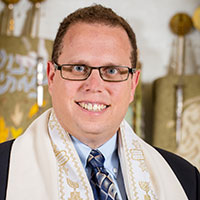Commentary on Parshat Vayeshev (Genesis 37:1 – 40:23)
In Andrew Lloyd Weber’s telling of the Joseph tale from Genesis, Joseph and the Amazing Technicolor Dreamcoat, one of the biggest laugh lines comes when Joseph, sexually pursued by the wife of his master Potiphar, yells out “I don’t believe in free love!” After this, in both Weber’s telling and the biblical account, Potiphar’s wife accuses Joseph of trying to assault her and Joseph goes from being the favored slave of Potiphar to an apparent lifetime in prison.
In recent months, we have seen the deserved downfall of many prominent men due to a pattern of sexual discrimination, harassment, and assault: Bill Cosby, Harvey Weinstein, Matt Lauer, and numerous politicians. We have also seen, especially in the political realm, those who have attained and maintain high position despite credible accusations and even outright admitting to such behaviors, often with defenders telling us it’s no big deal or it didn’t happen.
The othering of women by feeling entitled to their sexuality or belittling them is not just a problem coming from men who have attained high status or notoriety. I recently watched a video of male Lutheran pastors reading comments that had been said to female Lutheran pastors by parishioners and male colleagues. The othering of the female pastors was shocking to me as a viewer and to the men reading them, although quite less shocking to some of my female colleagues reacting to the video.
Sign up to receive Torah from T’ruah in your inbox each week.
The idea of entitlement to treat women as something other is also found among the so-called Incel group: misogynist men, lurking in dark corners of the Internet, justifying their hatefulness based on the unwillingness of women to engage with them sexually. The major difference between the powerful and the non-powerful is that the powerful men often have the means to get what they want.
Therefore, I find the narrative of Joseph jarring at this time, as we are in an era in which the stories and challenges of women are coming to light. So what do we do with this story of Joseph? We have a woman accusing a man of sexual assault. While the narrative tells us that this is not a fair accusation, we also know that the narrative was written or at least edited later exclusively by men. When we are in a time in which we are finally believing women, how do we dismiss the charge of Potiphar’s wife and consider Joseph fully innocent?
Another, less-known incident also occurs in this Torah portion and helps us understand the dynamics at play in both stories. Joseph’s brother Judah is in a position where he is a widower. His two eldest sons have died after being married to the same woman, Tamar, and he refuses to give his third son to her (as was her right in those days – why this was a benefit to her is a different discussion). As a powerless widow of unknown background, she seems to be out of options. Rather than bemoan her fate, she takes matters into her own hands. She disguises herself as a prostitute, attracts the attention of Judah, and is impregnated by him but keeps his staff and seal in lieu of the payment she never collected.
Find more commentaries on Parshat Vayeshev here.
When Tamar’s pregnancy is discovered, Judah, unaware of who the father is, orders her to be burned. She shows Judah his own staff and seal, and, after admitting these items are his, he rescinds his order declaring her “more righteous” than him. Judah could have kept this information from everyone else and still had Tamar burned, but he took the path of righteousness, accepting the sons as his own and never being intimate with Tamar again.
 These two incidents occur virtually back to back in our narrative and play off each other. The contrast between the stories, however, is rooted in the idea of otherness, and the Bible recognizes it well. Seeing this contrast helps us understand why we can believe in Joseph’s innocence in this incident.
These two incidents occur virtually back to back in our narrative and play off each other. The contrast between the stories, however, is rooted in the idea of otherness, and the Bible recognizes it well. Seeing this contrast helps us understand why we can believe in Joseph’s innocence in this incident.
Potiphar’s wife uses Joseph’s otherness against him. She says to her other servants “[Potiphar] brought us a Hebrew man to toy with us.” In this case Joseph was the outsider, someone from whom Potiphar’s wife felt she was owed whatever she wanted. Therefore, when she didn’t get it, she used his powerlessness against him. Conversely, Judah, when he realizes what he has done, ignores Tamar’s otherness and relative powerlessness and instead sees her as a fellow person, trying also to get by in a challenging world.
This is the root of the issue. When we see people not as people, but as something other, it becomes easier to exploit and dismiss them. Potiphar’s wife saw Joseph as nothing but a plaything, so when he demonstrated his humanity, she turned on him. When Judah was confronted, he looked at Tamar and saw her as a person. He recognized that he had done wrong by her and made it right.
Rabbi Daniel Plotkin is Rabbi Educator of Temple Isaiah in Fulton, Maryland.

